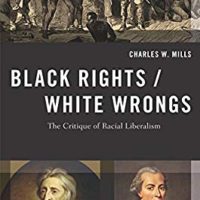
Charles Mills (City University of New York)
3200 Jean-Brillant
Montréal
Dans le cadre du cycle des conférences féministes du CRÉ, et en collaboration avec le GRIPP, nous avons le plaisir d’accueillir Charles Mills, qui nous offrira une présentation intitulée « Black Rights White Wrongs: The critique of Racial Liberalism ».
Charles Mills is Distinguished Professor of Philosophy at The Graduate Center, City University of New York. He is a political philosopher, working in the area of oppositional political theory, as centered on race and class. He is the author of numerous articles and six books, among which are The Racial Contract (1997) (winner of the Gustavus Myers Outstanding Book Award), Blackness Visible: Essays on Philosophy and Race (1998) (finalist for the award of the most important North American work in social philosophy of that year), Black Rights/White Wrongs: The Critique of Racial Liberalism (Oxford University Press 2017).
Résumé/abstract:
Liberalism’s promise of equal rights has historically been denied to blacks and other people of color. Black Rights/White Wrongs: The Critique of Racial Liberalism argues that rather than being irrelevant to the workings of self-conceived liberal polities today, this history of denial and its current legacy should be regarded as continuing to shape liberalism in fundamental ways. As feminists have conceptualized the dominant form of liberalism as a patriarchal liberalism, this book suggests seeing it as a racialized liberalism. Accordingly, the chapters look at racial liberalism, past and present: “white ignorance” as a guilty ignoring of reality that facilitates ongoing white racial domination; Immanuel Kant’s role as the most important liberal theorist of both personhood and sub-personhood; the centrality of racial exploitation to the economy of the United States; and the evasion of the realities of white supremacy and the need for corrective racial justice in John Rawls’s hugely influential “ideal theory” framing of the derivation of principles of social justice. Nonetheless, the book argues that a deracialized liberalism is both possible and desirable. But it will be necessary to reconstruct liberalism on a new foundation that self-consciously takes its unacknowledged racial history into account.
Organisation: Ryoa Chung, Naïma Hamrouni et Arash Abizadeh.



